Taxes and Student Loans in Bankruptcy
Taxes and Student Loans in Bankruptcy There are certain kinds of debt that can be discharged in bankruptcy. A Chapter 7 bankruptcy is a great way to reduce or eliminate many debts. A Chapter 7 bankruptcy can help discharge credit card debts, medical debts and many other types of unsecured debt. A Chapter 7 bankruptcy […]
What Do You Lose if You Declare Bankruptcy?
Before you finally go to the judge or court to file for bankruptcy, the major worry to have is what you stand to lose. It might be your house, property, a potential job, or client as the record of your bankruptcy is available to public access. Bankruptcy is the last resort when the debt starts […]
Will Bankruptcy Forgive Student Loans?
Will student loans ever be forgiven during bankruptcy? The answer is: PERHAPS! President Obama spoke to the Georgia Institute of Technology recently on March 10, saying that his administration is looking into the idea. He revealed that he’d ordered officials to look into whether or not making student loans forgivable during bankruptcy would be helpful […]
Is Bankruptcy Right for You?
If you are facing financial challenges and considering bankruptcy in Bellevue, Seattle, or Washington State, watch the following video which has Bellevue Bankruptcy Attorney Jonathan Smith discussing bankruptcy in Seattle, Bellevue, and Washington State, specifically Chapter 7 Bankruptcy on King 5 New Day Show. The first thing you should do if you are facing bankruptcy […]
Filing for Bankruptcy

Filing for Bankruptcy – When, How, & Why Determining if you Qualify for Bankruptcy Individuals file personal bankruptcy because there is financial relief needed and they seek a second start. If you feel there is no way out of your debt troubles and these debt troubles are regular occurrences, filing bankruptcy may be your best […]
Bankruptcy or Foreclosure Looming?
Bankruptcy or Foreclosure Looming? Let The Washington Foreclosure Fairness Act Help you! New Mortgage Foreclosure Program for the State of Washington. A little known Mortgage foreclosure program went into effect in Washington State in 2011. It is called the Washington foreclosure fairness act (FFA). This program is for you if you need help paying your […]
Preventing Bankruptcies
We are in some unusual and unprecedented times right now but that doesn’t’ mean you can’t prepare and still have some time to plan. People use the phrase “Practice good money management.” However, what does this really mean? Terms like impulse spending, realistic budgeting, and no high-risk investment are not part of the “good practice.” […]
Will Bankruptcy Mean I Have to Give up My House?
Will Bankruptcy Mean I Have to Give up My House? – A common question weighing on the minds of those who are still making mortgage payments on their home and facing bankruptcy is “will I have to give up my home?” The answer to this lies in understanding the options available to your unique situation. […]
What to Do After Filing for Personal Bankruptcy
Many people feel like absolute failures after filing for bankruptcy. Therefore, you may be surprised to learn that it’s actually becoming more and more common and that YOU’RE NOT ALONE. Bankruptcy happens to the answer for many debtors who simply need a fresh start. Now, the question is, “what do I do now to ensure […]
How Quickly Can I Recover from a Bankruptcy?

Filing for bankruptcy is never an easy decision. If you are considering bankruptcy or if you have been through it, there is probably just one question on your mind: “How quickly can I recover from bankruptcy?” There are many factors that contribute to the time you will spend mending your credit. The first step you […]
